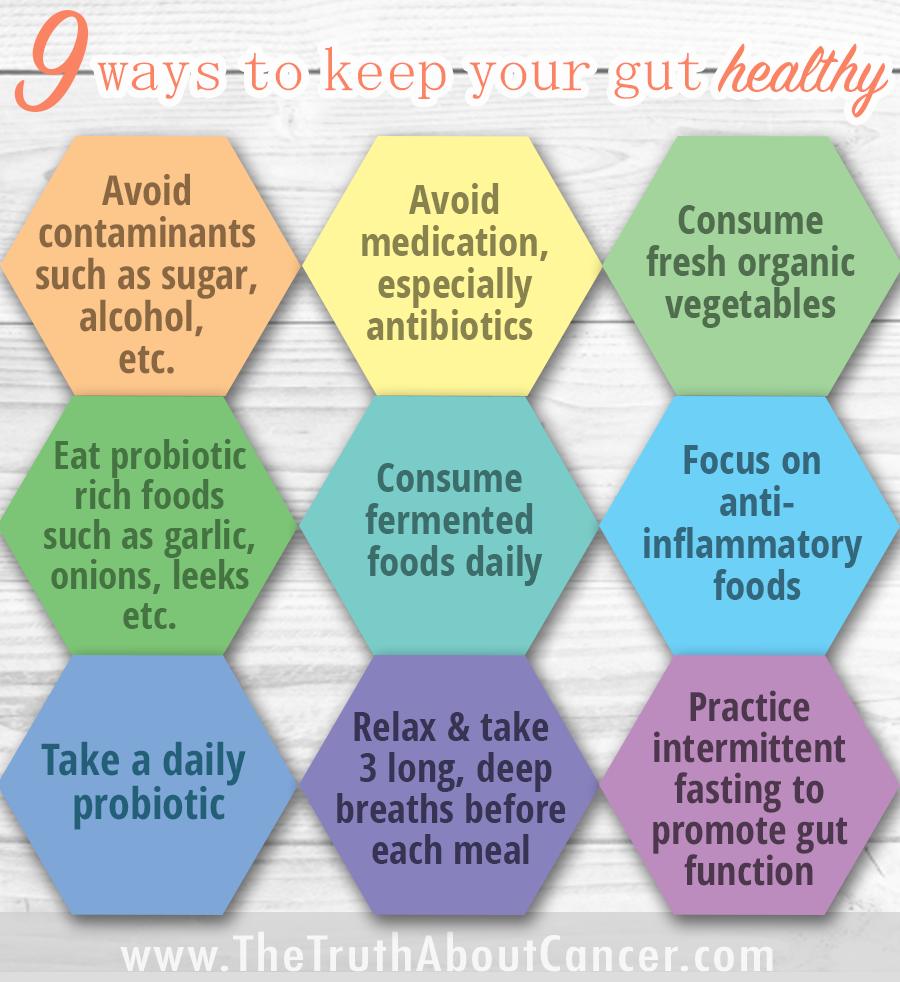How Your Gut Bacteria Control Your Response to Cancer Treatments
The gut microbiota and
its effect on the immune system has been a major topic for discussion in
the past decade. We have only begun to understand that the microbes
that inhabit our gut (our “gut bacteria”) can influence the immune
system. In return, our immune system similarly impacts the existence of
healthy and harmful bacteria in our gut.
Even more recently the topic of immunotherapy can offer hope to cancer patients seeking more than a treatment. Researchers have identified that bacteria responses play a critical role in communication with the immune system so impressively that certain bacteria may potentially be used in immunotherapy as a cure for cancer. In the meantime, you can maintain a healthy gut microbiota to help prevent illness and improve the efficacy of cancer treatments today.
Various factors control an individual’s immune response to cancer treatment. This is evident in the many ways the same chemotherapeutic drug can elicit different responses and adverse reactions in cancer patients. Such factors include metabolism, infection, bacteria imbalance (dysbiosis), and environment. With optimal microbiota conditions, the immune system can more effectively exhibit anticancer activity by repairing tissue and limiting toxins.
The drug used in study to test the benefits of bacterial strains, ipilimumab, was recently approved in 2011 to treat melanoma cancer. When cancerous mice containing normal gut bacteria were given ipilimumab, they exhibited improved healing such as reduced abdominal inflammation unlike the mice with germ-free or antibiotic-treated systems.
Results showed that the cancer treatment drug ipilimumab depletes Bacteroidales and Bifidobacteria as it simultaneously improves the body’s immune response to attack and treat cancer. This supports the need to continually maintain a healthy gut microbiota.
In other words, patients with antibodies which function as an antagonist to shut down CTLA-4 exhibit antitumor effects. Ipilimumab acts as an antibody to block the protein’s receptors but is dependent on Bacteroides species. Again, the antibiotic-treated and germ-free mice exhibited no abilities to block the receptors on CTLA-4 and therefore, no anti-cancer effects.
Beneficial bacteria inhibit the release of inflammatory agents and free radical stimulants which devastate immune function and promote carcinogenesis (the initiation of cancer formation).
Although genetics plays a role in cancer development, you can avoid risk factors which damage your immune system’s ability to fight infectious agents like cancer. Antibiotic use, smoking, and diet are major contributors. Not only did germ-free and antibiotic-treated mice in research show zero potential for improving the efficacy of cancer treatment, they also lost the ability for tumor invasive lymphocytes to destroy cancer cells.
Infections of the gut such as leaky gut syndrome and colitis induce
carcinogenic activity from bacteria. Maintaining healthy conditions
within the digestive tract is as easy as improving your digestion.
Here is a list of strategies that can provide you with effective techniques to improve the health of your gut microflora and offer anti-cancer benefits to your whole body:
Please help bring more awareness about gut bacteria and cancer fighting by sharing this article with your friends and family below.

Even more recently the topic of immunotherapy can offer hope to cancer patients seeking more than a treatment. Researchers have identified that bacteria responses play a critical role in communication with the immune system so impressively that certain bacteria may potentially be used in immunotherapy as a cure for cancer. In the meantime, you can maintain a healthy gut microbiota to help prevent illness and improve the efficacy of cancer treatments today.
The Interaction Between Your Gut Bacteria and Immunity
The gut microbiota consists of the community of microorganisms that colonize the digestive tract. Of the one hundred trillion organisms that inhabit the intestine, bacteria are the predominant residents amongst other agents such as viruses and fungus. When bacteria exist in a mutually healthy relationship with the human body, it can help inhibit the development of cancer and its growth by regulating chemotherapeutic pathways controlled by the immune system.Various factors control an individual’s immune response to cancer treatment. This is evident in the many ways the same chemotherapeutic drug can elicit different responses and adverse reactions in cancer patients. Such factors include metabolism, infection, bacteria imbalance (dysbiosis), and environment. With optimal microbiota conditions, the immune system can more effectively exhibit anticancer activity by repairing tissue and limiting toxins.
Bacteroidales and Bifidobacteria
Two major categories of bacteria known as Bacteroidales and Bifidobacteria seem to correlate with a strong immune system, reflected by the body’s capability to inhibit cancer growth. In fact, one group of researchers at the University of Chicago learned that these gut microbes actually decreased the growth of tumors comparable to a chemoprevention drug now being tested in human clinical trials.The drug used in study to test the benefits of bacterial strains, ipilimumab, was recently approved in 2011 to treat melanoma cancer. When cancerous mice containing normal gut bacteria were given ipilimumab, they exhibited improved healing such as reduced abdominal inflammation unlike the mice with germ-free or antibiotic-treated systems.
Results showed that the cancer treatment drug ipilimumab depletes Bacteroidales and Bifidobacteria as it simultaneously improves the body’s immune response to attack and treat cancer. This supports the need to continually maintain a healthy gut microbiota.
Targeting CTLA-4
A critical protein which assists in regulating the immune system is known as CTLA-4 (cytotoxic T-lymphocyte-associated protein 4). Ipilimumab attempts to block the CTLA-4 response associated with downregulating the immune system and is one of the first treatments categorized as immune checkpoint blockade therapy.In other words, patients with antibodies which function as an antagonist to shut down CTLA-4 exhibit antitumor effects. Ipilimumab acts as an antibody to block the protein’s receptors but is dependent on Bacteroides species. Again, the antibiotic-treated and germ-free mice exhibited no abilities to block the receptors on CTLA-4 and therefore, no anti-cancer effects.
Avoid Risk Factors for Dysbiosis
The need for healthy gut microflora is a necessity for equipping the immune system with the right tools for healing. Bacteria in the gut are required for nutrient absorption, and breaking down toxins for elimination. It is also required for regulating both a local and external immune system response from the intestines to the skin.Beneficial bacteria inhibit the release of inflammatory agents and free radical stimulants which devastate immune function and promote carcinogenesis (the initiation of cancer formation).
Although genetics plays a role in cancer development, you can avoid risk factors which damage your immune system’s ability to fight infectious agents like cancer. Antibiotic use, smoking, and diet are major contributors. Not only did germ-free and antibiotic-treated mice in research show zero potential for improving the efficacy of cancer treatment, they also lost the ability for tumor invasive lymphocytes to destroy cancer cells.
 10 Strategies for Maintaining Healthy Gut Bacteria
10 Strategies for Maintaining Healthy Gut Bacteria
Infections of the gut such as leaky gut syndrome and colitis induce
carcinogenic activity from bacteria. Maintaining healthy conditions
within the digestive tract is as easy as improving your digestion.Here is a list of strategies that can provide you with effective techniques to improve the health of your gut microflora and offer anti-cancer benefits to your whole body:
- Avoid contaminants such as sugar that destroy beneficial gut bacteria. Sugar increases harmful gut microbes and promotes inflammation.
- Avoid taking medication when possible − especially antibiotics. Broad-spectrum antibiotics like ampicillin and streptomycin devastate bacteria colonies and compromise anti-cancer therapies.
- Consume fresh organic or no-spray vegetables from farmers markets where they have yet to be scrubbed. This will allow you to get good soil-based microorganisms that help to reduce bad microbial overgrowth and improve digestive and immune function. (Note: This doesn’t mean to eat vegetables covered in dirt, but a tiny amount of good quality dirt won’t hurt you.)
- Take a daily probiotic. A once daily probiotic can improve health by increasing the transit time which food and toxins pass through the body, stimulating regular bowel movements.
- Consume fermented foods daily. Add small quantities of fermented veggies like kimchi and sauerkraut to meals and drink fermented beverages like coconut water kefir. Use raw apple cider vinegar in water or on foods to help improve your microbiome.
- Eat prebiotic rich foods which promote healthy bacteria growth. Some of these foods include vegetables such as garlic, onions, leeks, jicama, and asparagus.
- Focus on anti-inflammatory foods such as dark leafy greens and herbs which promote detoxification and balance intestinal pH.
- Benefit from the antioxidant components of berries known as phenolic compounds that are broken down in the colon and improve detoxification processes. Blackcurrant powder is shown to exhibit the same effects as prebiotics and increases Bifidobacteria concentrations. Add it to your smoothies and dessert recipes for an added chemopreventive boost.
- Take time to relax before eating. When we eat on the go we don’t get adequate digestive juice (stomach acid, bile, and pancreatic enzymes) for optimal digestion. This causes stress on the digestive tract, promotes bad microbial overgrowth, and intestinal inflammation. Take three long, deep breaths before beginning each meal to help relax the body and improve digestion.
- Consider intermittent fasting to promote the gut function. Fasting for a minimum of 12 hours in a day while drinking plenty of water, herbal teas, and fermented drinks can promote enzymatic function and chemopreventive physiological responses.
Balance Your Gut Bacteria for Long Term Good Health
Whether you are trying to prevent cancer or heal from cancer, you should be focused on improving your digestive system and balancing your gut microbiota. These gut microbes play an enormous role in how we metabolize our food, extract nutrient, and respond to both conventional and alternative cancer treatments. By following the action steps in this article you can begin improving your microbiome and reduce your disease risk.Please help bring more awareness about gut bacteria and cancer fighting by sharing this article with your friends and family below.
Article Summary
- The microbes that inhabit our gut (our “gut bacteria”) can
influence our immune system and in return our immune system impacts the
existence of healthy and harmful bacteria in our gut.
- Certain bacteria may potentially be used in immunotherapy as a
cure for cancer. In the meantime, you can maintain a healthy gut
microbiota to help prevent illness and improve the efficacy of cancer
treatments today.
- When bacteria exist in a mutually healthy relationship with the
human body, it can help inhibit the development of cancer and its growth
by regulating chemotherapeutic pathways controlled by the immune
system.
- Two major categories of bacteria known as Bacteroidales and Bifidobacteria seem to correlate with a strong immune system, reflected by the body’s capability to inhibit cancer growth.
- You can avoid risk factors which damage your immune system’s
ability to fight infectious agents like cancer. Antibiotic use, smoking,
and diet are major contributors to your cancer risk.
- Here are 10 strategies that can improve the health of your gut microflora and offer anti-cancer benefits to your whole body:
- Avoid sugar
- Avoid taking medication when possible
- Consume fresh organic or no-spray vegetables
- Take a daily probiotic
- Consume fermented foods
- Eat prebiotic rich foods
- Focus on anti-inflammatory foods
- Benefit from the antioxidant components of berries
- Take time to relax before eating
- Consider intermittent fasting

No comments:
Post a Comment